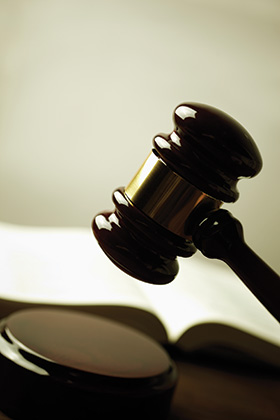EDITORIAL: Break the cycle of vexatious litigation
By: WISCONSIN LAW JOURNAL STAFF//May 5, 2014//
 Trust is at the heart of the court system.
Trust is at the heart of the court system.
The public trusts that judges are committed to ruling fairly and with a complete understanding of the laws that apply. When people do not trust a judge’s decision, they can appeal, and often do.
Judges trust that plaintiffs who bring claims have legal basis to do so. When plaintiffs repeatedly violate that trust, judges can restrict the ability to file.
But they rarely do.
That lack of action is damaging the integrity of the court system.
Take, for example, the three litigious Madison residents who are the subjects of this month’s cover story. In five years, they have racked up 25 claims, many of which were dismissed as baseless.
Richard Posner, a 7th U.S. Circuit Court of Appeals judge, recently called the spate of suits “an abuse of the legal process” and recommended federal judges bar one of the three Madison residents from filing lawsuits until she pays off the sanctions she has received.
Posner is right.
State and federal judges have the tools — including imposing sanctions and, in some cases, restricting a litigant’s access to the court — but they rarely use them.
Judges say they don’t want to restrict the public’s access to the courts. But by letting frivolous lawsuits march repeatedly through their courtrooms, judges do a disservice to those who deserve the trust of the system.
There are not many of them, but those who can be deemed vexatious litigants are a drag on the court system, and they need to be stopped.
Time and again, they demonstrate that the threat of money lost is not enough of a deterrent. Rather, they appeal those sanctions, extending the time spent on their often meritless cases.
It is enough of a problem that Waukesha County Circuit Judge Ralph Ramirez said it “makes the administration of the court difficult.” Ramirez has dealt with vexatious litigants on a number of occasions, he said, and one case resulted in protests on his lawn.
In one instance, he restricted the plaintiff from filing further actions.
“You don’t want to limit people’s access to the courts,” Ramirez said. “This is what makes our civilization civil.
“But at the same time, as judges and other litigants, the public has a right to have order and reason in the courts. Litigants have to have the ability to have cases move forward.”
It is clear, though, that the actions of a few are infringing on the rights of the many.
Several states have enacted laws to prevent vexatious litigants from further burdening the courts. Often categorizing such litigants as those who repeatedly file meritless lawsuits — for example, five or more in a period of, say, five years — legislation in states such as California, Connecticut, Florida, Hawaii, Ohio, Texas and, most recently, Arizona, lays out specific guidelines for judges to restrict those plaintiffs from filing further actions.
Federal courts have their own rules, but at the state level, more should be done to make clear that judges do not have to waste their time or the public’s on vexatious litigants. Wisconsin judges have options now, but the guidelines often fade to gray.
Black and white rules stating when a litigant qualifies as vexatious would make it easier for judges to know when to limit further filings. Such rules should affect only the most flagrant of those frequent frivolous filers.
If trust is the centerpiece of the court system, there should be meaningful consequences for those who violate it.
Legal News
- State Bar leaders remain deeply divided over special purpose trust
- Former Wisconsin college chancellor fired over porn career is fighting to keep his faculty post
- Pecker says he pledged to be Trump campaign’s ‘eyes and ears’ during 2016 race
- A conservative quest to limit diversity programs gains momentum in states
- Wisconsin prison inmate pleads not guilty to killing cellmate
- Waukesha man sentenced to 30 years for Sex Trafficking
- 12-year-old shot in Milwaukee Wednesday with ‘serious injuries’
- Milwaukee man convicted of laundering proceeds of business email compromise fraud schemes
- Giuliani, Meadows among 18 indicted in Arizona fake electors case
- Some State Bar diversity participants walk away from program
- Wisconsin court issues arrest warrant ‘in error’ for Minocqua Brewing owner
- Iranian nationals charged cyber campaign targeting U.S. Companies
WLJ People
- Power 30 Personal Injury Attorneys – Russell Nicolet
- Power 30 Personal Injury Attorneys – Benjamin Nicolet
- Power 30 Personal Injury Attorneys – Dustin T. Woehl
- Power 30 Personal Injury Attorneys – Katherine Metzger
- Power 30 Personal Injury Attorneys – Joseph Ryan
- Power 30 Personal Injury Attorneys – James M. Ryan
- Power 30 Personal Injury Attorneys – Dana Wachs
- Power 30 Personal Injury Attorneys – Mark L. Thomsen
- Power 30 Personal Injury Attorneys – Matthew Lein
- Power 30 Personal Injury Attorneys – Jeffrey A. Pitman
- Power 30 Personal Injury Attorneys – William Pemberton
- Power 30 Personal Injury Attorneys – Howard S. Sicula











